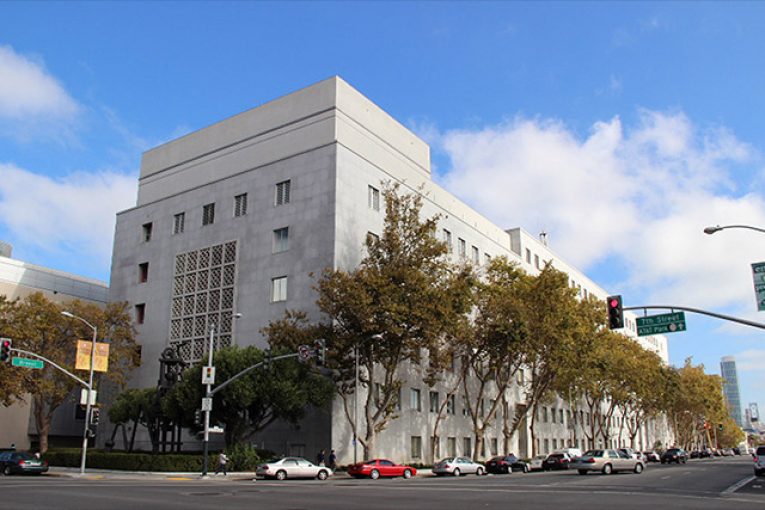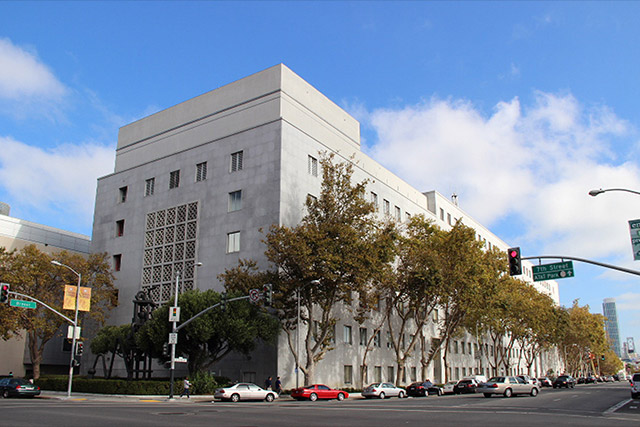

by SF Court Watch Staff
The defense has challenged the collection of DNA from a defendant in a high-profile serial rape case and Judge Lam will now take the matter under advisement as he asked for additional briefing from the two sides.
On Thursday, both sides presented their summations to Superior Court Judge Newton Lam with widely divergent arguments as to what the outcome of potentially illegally obtained DNA evidence. The defense seeks to quash or traverse the search warrant obtained by police after the pretext stop and warrantless DNA search on the defendant.
Assistant District Attorney Lailah Morris in her arguments said on the night of July 7, 2018, SF Police had been investigating a set of related rape cases. Four separate rapes were done by the same person, dubbed the “Rideshare Rapist,” and linked by DNA evidence.
Inspector Mark Lee was charged with finding a serial rapist. They focused their attention on the 500 block of Howard because, she argued, three of the four victims were abducted from that area by a man operating or posing as a rideshare driver.
All four victims were inebriated, they were by themselves or with only one other person, and picked up by somebody “who pretended to be their ride home to safety,” according to Morris.
Inspector Lee and Sgt. Chan ran a surveillance operation that night to gather information about the driving patterns of rideshare drivers in the area. Specifically, they were looking for any suspicious drivers that might be participating in predatory behavior. They noted the presence of a vehicle driven by the defendant, Orlando Vilchez Lazo in the area  populated with active nightclubs that evening as he circled the block with a Lyft sticker on the back of his car without picking up any fares. For over an hour and fifteen minutes, they surveilled the vehicle, often following him around the block or stopping to observe him from across the street.
populated with active nightclubs that evening as he circled the block with a Lyft sticker on the back of his car without picking up any fares. For over an hour and fifteen minutes, they surveilled the vehicle, often following him around the block or stopping to observe him from across the street.
He circled the block, DA Morris said, six or seven times, “never picking up a passenger.” That night, all of the women were in groups and therefore he was unable to find a victim, the DA alleged.
Ms. Morris argued, “Based on his erratic driving… provided probable cause for the rapes.”
“They would have been well within their rights under the Fourth Amendment to arrest him for all four rapes,” she claimed. “But Mark Lee, having done this type of work for years knew that he wanted to make sure that it stuck… so that this predator would be off the street for good.”
She said that Inspector Mark Lee decided that “he may also be DUI,” so he called for a marked unit that observed a traffic violation that served as additional legal justification for him being detained. She said there was absolutely reasonable suspicion, a low legal threshold she pointed out, to stop Mr. Vilchez Lazo.
She said actions of the officers were reasonable because “he didn’t want to let a serial rapist know that they’re onto him. He doesn’t want that precious evidence to be destroyed.”
When the marked patrol car pulled the defendant over, they had to wait about 20 minutes for someone to bring a PAS (Preliminary Alcohol Screening) device from a nearby police station.
She argued, “There is nothing in the constitution that says, they have to divorce themselves from a very serious case when presented with a DUI.” The only thing that didn’t occur here, she said was the Field Sobriety Test (FST). “You can have a DUI investigation going on at the same time as a rape investigation.”
She said that how the officers were responding to unfolding information, “is the height of reasonableness under the Fourth Amendment.”
She said they were following him and observing how he’s acting, “how he’s acting is consistent with a rapist, but it’s also consistent with someone who might be under the influence of alcohol.”
Ms. Morris did acknowledge, “if it had been DUI, that PAS would have likely been excluded. He wasn’t given the proper statutory applications potentially.”
“Was the administration of the PAS inconsistent with the Fourth Amendment?” she argued, “it wasn’t because there was reasonable suspicion to detain him for the DUI – it’s a very low threshold.”
The next question, she said, “Is that PAS device, the DNA collected on it, a separate search?” she rhetorically asked. “In this case, it’s not.”
She argued that the defendant “never asked for those mouthpieces back.” She added, “He never even asked why they were taking them.”
The officers basically instructed him to put his saliva on the PAS device, to lick it, and such.
“He is 100% on notice that they’re going to have access to his saliva, his DNA, his evidence,” she said. “It’s absolutely an abandonment of his DNA.” They were absolutely within their right to use that evidence, she argued.
After they identified him as the rapist through the DNA, two of the four victims then identified him as the rapist through a six-pack photo line-up.
But the account given by the prosecutor didn’t comport with either the facts or the timeline according to Deputy Public Defender Sandy Feinland.
“It is shocking and astonishing that the DA would tell this court that Inspector was conducting a valid DUI stop and that would justify him having other officers after waiting 20 minutes to tell Mr. Vilchez Lazo to blow into the PAS device and to spit on it, and to lick it and to make sure he puts a lot of saliva on it,” Mr. Feinland opened his argument.
He argued that other officers testified that “this was a staged DUI investigation. That he called them to pretend it was a DUI investigation. That they were not conducting a DUI investigation.”
The sole reason they had him blow into this device was “in order to get his DNA.”
Mr. Feinland argued that Inspector Lee’s testimony was completely contradicted by all of the other officers. Not only that but one of the officers had a body-worn camera which he had left on and allowed to record the conversation between the officers and the inspector. On the body-worn camera footage, Inspector Lee can be heard telling the uniformed officers, “I want his DNA.”
In the conversation that they heard, Inspector Lee said, “Why did you pull him over?” Mr. Feinland argued, “Officer Rosales had no reason.”
He continued, “We hear Officer Lee say, ‘Just fuckin’, just tell him whatever. Just tell him we saw you swerve.’”
Officer Smith testified that he asked Inspector Lee, “what about the Fourth Amendment?”
According to Mr. Feinland, Inspector Lee did not indicate that there was not a Fourth Amendment problem in this case. He didn’t cite the probable cause from observations in the field. He didn’t say that he was suspicious that he was drunk driving.
Instead, Inspector Lee said, “Don’t worry about it. Everyone on the road consents to having chemical tests done.”
Deputy Public Defender Feinland argued that it is “completely wrong” and that “there is no implied consent to the PAS device.” In fact, it’s the opposite and people get admonished that they can refuse the chemical test. Furthermore, Feinland argued, there was no cause for a DUI stop and the defendant blew a 0.0 on the test that officers administered.
“This conduct is flagrant, your honor,” he said. “A superior officer directing rookies to do these things, directing them to lie to Vilchez Lazo.”
“Now they’re trying to Monday morning quarterback to say, we had probable cause anyway,” he added.
He called this work by police, “a hunch – a hunch to fabricate a reason for stopping and to get that person’s DNA. It was a phishing expedition.”
“The court should throw out this DNA evidence,” Mr. Feinland argued calling it “tainted fruit.”
He pointed out that the subsequent evidence such the license plate reader info and the photo line-up were “collected immediately after the DNA results came back,” arguing the subsequent evidence against his client should be tossed out under the Fruit of the Poisonous Tree legal doctrine because it arose from a constitutional violation.
“The issue I’m hoping the court focuses on is that the timing of this points to nothing other than evidence collected being tainted proof.” He said the search warrant, signed by Judge Lam himself, itself is the product of the illegal search.
Lailah Morris accused the defense of calling all of the officers, liars.
“He can’t have it both ways,” she said. “Officer Hicks and Officer Rosales documented to the best of their ability what they observed that night. There has been no evidence to contradict anything that the police officer said about how the traffic stop went down.”
She chalked up the video interplay to “a miscommunication between patrol and investigation” or “a lack of information.” This, she argued, “does not make everyone a liar, does not mean it was a made-up investigation and it doesn’t make it a violation of the Fourth Amendment.”
Judge Lam, while not yet ruling on the case, seemed to downplay the legal issues cited by the defense. He explained why he signed the search warrant in the first place. He said when he was looking at the declaration of probable cause, he asked himself, “what in that document would give me probable cause to issue a warrant.”
“I knew it was serious,” he said explaining that he read it a few times. “There’s not much information regarding that pretext stop.”
When asking himself about the reasons for the arrest, “I didn’t even think about the DNA. I thought about all of the detective work with regards to the plate, the activity, the person, and the vehicle.”
“I did find there was reasonable suspicion to stop and identify,” he said. The judge misstated that there was already information with regards to the identification, the vehicle and the activity prior to the DNA. “If I don’t have the DNA, what do I have, I have the photo identification.”
But as the defense pointed out – the photo identification was based on the DNA evidence that was obtained.
Judge Lam invited both sides to provide additional briefing to him, but seemed to defend his decision to sign the search warrant in the first place after the officers had already collected the defendant’s DNA unbeknownst to him.




